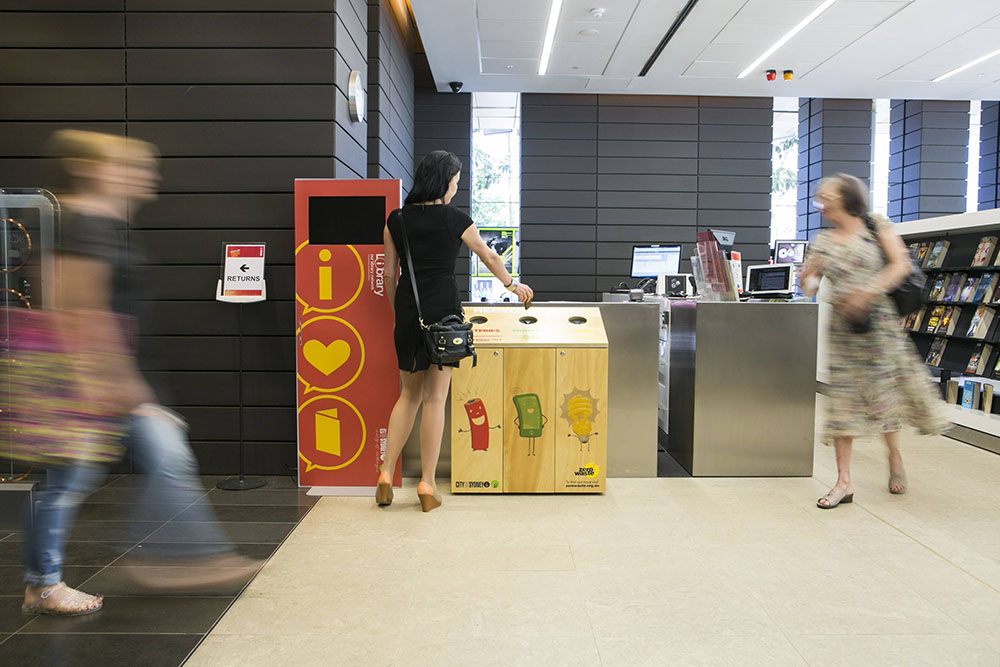
E-waste recycling drop off station in Surry Hills Library (Photo by Jamie Williams/City of Sydney)
The modern Australian suburban street has become defined by big driveways, pretty gardens, snazzy letterboxes, and curb side pickup piles full of e-waste.
This common sight of old electronic junk at the front of households whose occupants are tossing away their broken computers or outdated televisions has increased in recent years.
The reason for this is that consumer goods from the last two decades have had a substantially lower shelf-life than their legacy ancestors from the 1950s boom onwards when household appliances were supposedly “built to last”.
Over the years, many consumers held onto their old CRT screens, VCRs and DVD players like cherished treasures. But as these goods have burnt out and their replacement rate has increased, people have just as rapidly disposed of them.
But what many don’t realise when they’re chucking out their antiquated electronics on their curb for proper disposal so that they don’t have to haul it all to the local rubbish tip, is that these items are loaded with toxic components such as lead, mercury and arsenic.
If they leak into local waterways, they can potentially cause immense environmental damage.
This is especially true for consumables such as mobile phone batteries, which tend to charge to full capacity for about 18 months before they begin to show signs of becoming swollen.
Although mobile phone batteries are marked with warnings not to dispose in a general waste bin, it’s unclear how many people ignore that warning, therefore causing potential environmental damage.
This continuing trend of obsolescence has created big challenges for local governments that have had to face the problem of how to help people dispose of their e-waste.
The problem has put councils under pressure to act on the problem or risk being overwhelmed with electronic junk at refuse sites while they could have been recycled instead.
That’s where councils like the City of Sydney have come in with their own e-waste recycling programs that have been created to keep these items out of landfill.
The City of Sydney’s own program was initiated in 2008 where e-waste pick up days are scheduled quarterly and people are encouraged to submit as much electronic junk as possible.
According to the City, the most recent e-waste collection day had 541 drop-offs with TVs, computers and monitors among the most popular items brought in for recycling.
This equated to around 15 tonnes of computers, computer products and other types of e-waste collected.
And the City has commended its latest trial in e-waste disposal which has delivered the e-waste program to apartment blocks, with special recycling bins in six large apartment buildings serving 1,500 apartments.
According to the City, residents in the six apartment blocks provided with dedicated e-waste recycling units last year “responded enthusiastically” with over 16 tonnes collected in the 15 months since the trial started.
Lord Mayor Clover Moore said the City’s apartment recycling stations provide a simple solution for residents to get rid of waste without even leaving home.
“Our e-waste initiatives are making it easier for the community to responsibly dispose of unwanted and potentially hazardous waste,” Ms Moore said.
She said the stations have recycled over 1,500 kilograms of batteries, 400 kilos of pre-loved mobile phones and 250 kilos of light bulbs since the trial began 18 months ago, resulting in over 90,000 items being kept out of landfill.
According to the City, almost 70 per cent, or about 20,000 tonnes of its household waste has been diverted from landfill each year, exceeding state-wide targets.
The annual numbers at the individual level are also massive, with each city resident produces about 335 kilograms of household waste on average each year.
The process for sorting out this refuse is demanding as it’s all collected and taken directly to an advanced waste treatment facility where any remaining recyclables are recovered and organic materials are processed to produce low-grade compost.





